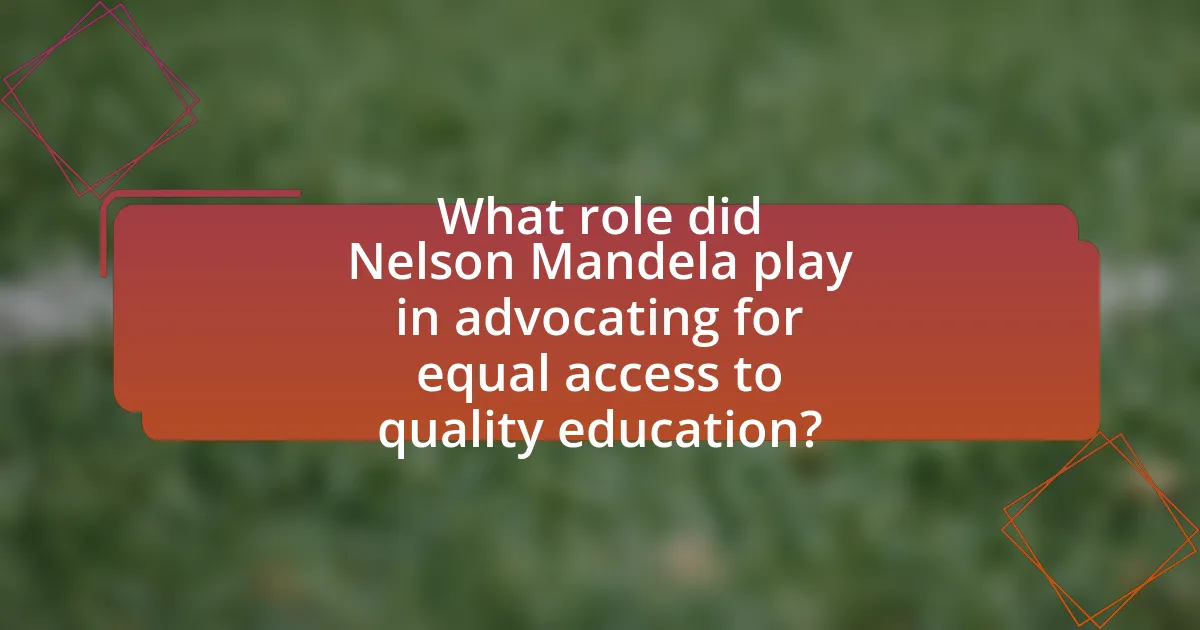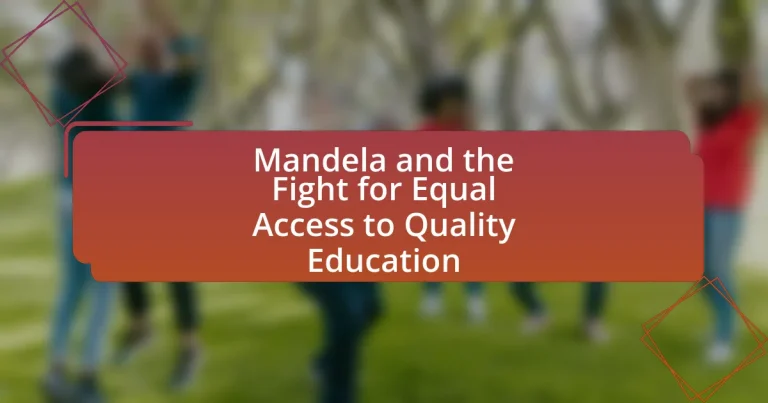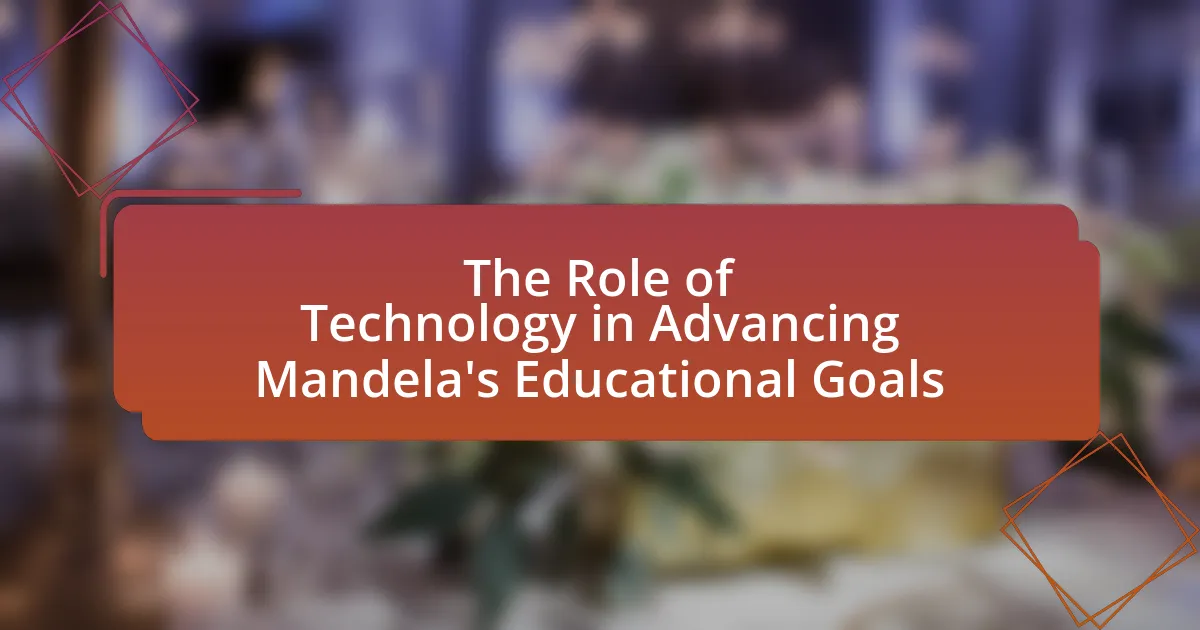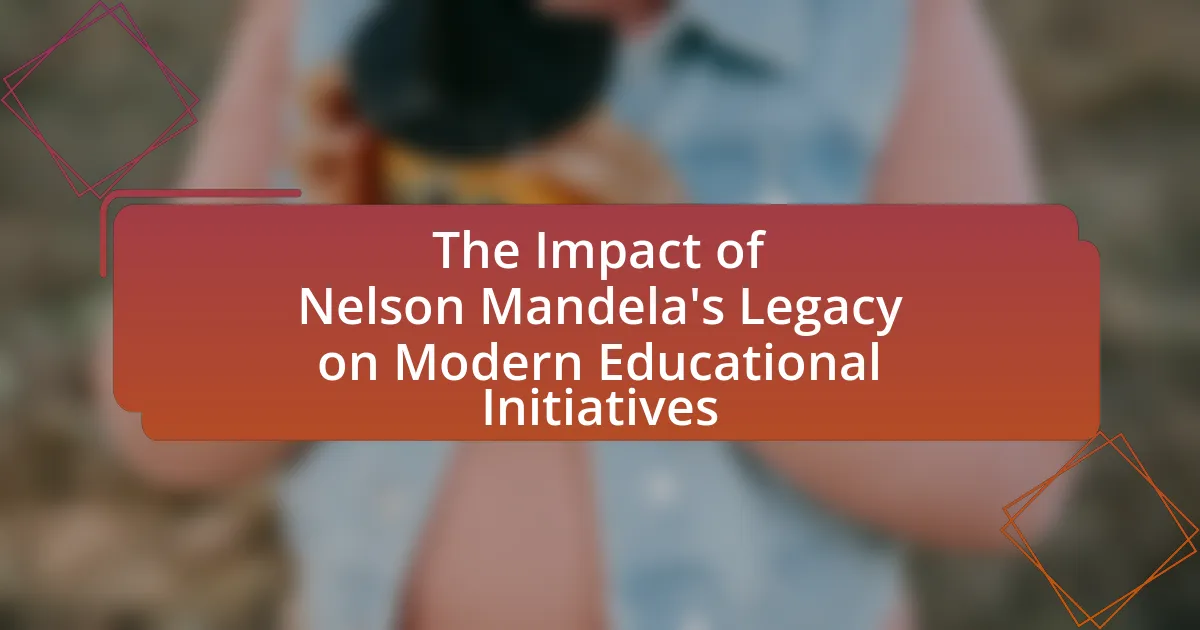Nelson Mandela is a central figure in the advocacy for equal access to quality education, viewing it as a fundamental human right and a means to combat systemic inequality in South Africa. His early experiences with educational disparities shaped his commitment to reform, leading to significant initiatives such as the South African Schools Act of 1996 and the National Education Policy Act, which aimed to provide equitable educational opportunities for all children. Mandela’s legacy continues to influence current educational practices and social justice movements, emphasizing the importance of inclusive policies and community advocacy in addressing educational inequities. The article explores Mandela’s impact on educational reform, the challenges he faced, and strategies for furthering his vision in today’s context.

What role did Nelson Mandela play in advocating for equal access to quality education?
Nelson Mandela played a pivotal role in advocating for equal access to quality education by emphasizing its importance as a fundamental human right and a tool for social change. He believed that education was essential for empowering individuals and dismantling the systemic inequalities entrenched in South African society. Mandela’s advocacy is evidenced by his establishment of the Nelson Mandela Foundation, which focuses on education and literacy initiatives, and his support for the South African Schools Act of 1996, aimed at providing equitable access to education for all children, regardless of their background. His commitment to education was further highlighted in his speeches, where he famously stated, “Education is the most powerful weapon which you can use to change the world.”
How did Mandela’s early life influence his views on education?
Nelson Mandela’s early life significantly shaped his views on education, emphasizing its importance as a tool for empowerment and social change. Growing up in the rural village of Mvezo, Mandela experienced the limitations imposed by apartheid, which restricted educational opportunities for Black South Africans. His exposure to the disparities in education fueled his belief that access to quality education was essential for achieving equality and justice. Mandela’s own educational journey, which included attending the University of Fort Hare, reinforced his conviction that education could enable individuals to challenge oppressive systems and uplift their communities. This foundational understanding of education’s transformative power became a central tenet of his activism and leadership in the fight for equal access to education in South Africa.
What experiences shaped Mandela’s understanding of educational inequality?
Nelson Mandela’s understanding of educational inequality was shaped by his experiences growing up in the rural village of Mvezo, where he witnessed the stark disparities in educational opportunities between black and white South Africans. Mandela attended a mission school, which provided limited education compared to the better-resourced schools available to white children. This early exposure to systemic inequality fueled his commitment to fighting for equal access to quality education. Additionally, Mandela’s involvement in the African National Congress and his advocacy for the rights of black South Africans further deepened his awareness of the broader implications of educational disparities in perpetuating social and economic injustices.
How did Mandela’s education impact his later activism?
Mandela’s education significantly shaped his later activism by providing him with critical thinking skills and a deep understanding of social justice. His formal education at institutions like the University of Fort Hare exposed him to political ideas and the realities of racial inequality in South Africa. This academic background enabled Mandela to articulate the struggles of his people and develop strategies for resistance against apartheid. Furthermore, his involvement in student politics during his university years fostered a commitment to activism, leading him to co-found the African National Congress Youth League in 1944. This foundation of knowledge and experience directly influenced his leadership style and approach to mobilizing communities for change.
What were Mandela’s key initiatives for educational reform?
Nelson Mandela’s key initiatives for educational reform included the establishment of the National Commission on Education, which aimed to address the disparities in the education system post-apartheid. He prioritized the integration of previously segregated schools and the improvement of educational infrastructure, particularly in underprivileged areas. Mandela’s government also implemented policies to increase access to education for all children, including the introduction of free primary education in 1996. These initiatives were supported by the Education White Paper 1, which outlined a vision for a unified and equitable education system in South Africa.
What policies did Mandela implement to promote equal access to education?
Mandela implemented several key policies to promote equal access to education, including the establishment of the South African Schools Act of 1996, which aimed to provide free and compulsory education for all children. This legislation abolished the racially discriminatory Bantu Education system and sought to integrate schools, ensuring that resources were allocated equitably across different racial groups. Additionally, the National Education Policy Act of 1996 was introduced to promote a unified education system that recognized the diverse needs of South Africa’s population. These policies were part of Mandela’s broader commitment to dismantling apartheid’s legacy and fostering inclusivity in education, ultimately aiming to improve educational outcomes for historically marginalized communities.
How did Mandela’s government address historical educational disparities?
Mandela’s government addressed historical educational disparities by implementing policies aimed at transforming the education system to ensure equal access for all South Africans. The government abolished the apartheid-era Bantu Education system, which had enforced racial segregation and inferior education for black students. Instead, it introduced the National Education Policy Act of 1996, which aimed to provide equitable education opportunities and improve the quality of education in historically disadvantaged communities.
Additionally, the government allocated increased funding to schools in underprivileged areas, established new schools, and promoted inclusive education practices. By 1999, the government reported that over 90% of children were enrolled in schools, a significant increase from the previous years under apartheid. These measures collectively aimed to rectify the imbalances created by decades of discriminatory policies in education.
Why is equal access to quality education important in the context of Mandela’s legacy?
Equal access to quality education is crucial in the context of Mandela’s legacy because it embodies his lifelong commitment to dismantling systemic inequality and promoting social justice. Mandela believed that education is a powerful tool for empowerment and transformation, as evidenced by his statement, “Education is the most powerful weapon which you can use to change the world.” His efforts in advocating for equal educational opportunities were pivotal in addressing the disparities faced by marginalized communities in South Africa, particularly during the apartheid era, where access to quality education was racially segregated. The establishment of initiatives aimed at improving educational access and quality reflects Mandela’s vision of an inclusive society where every individual has the opportunity to succeed, thereby reinforcing the importance of education as a fundamental human right.
What long-term effects did Mandela’s educational policies have on South Africa?
Mandela’s educational policies significantly improved access to quality education in South Africa, fostering greater equity and social mobility. These policies dismantled apartheid-era educational disparities, leading to increased enrollment rates in schools across all demographics. For instance, the introduction of the National Education Policy Act in 1996 aimed to provide equal educational opportunities, resulting in a rise from 6.5 million students in 1994 to over 12 million by 2005. Additionally, the focus on curriculum reform and teacher training has enhanced educational standards, contributing to a more skilled workforce. This long-term impact is evident in the growing number of South Africans pursuing higher education, which increased from 600,000 in 1994 to over 1 million by 2015, reflecting a shift towards a more educated society.
How does Mandela’s vision for education continue to influence current educational practices?
Mandela’s vision for education, which emphasized equal access and the transformative power of education, continues to influence current educational practices by promoting inclusive policies and curricula that address social inequalities. His belief that education is a powerful tool for social change has led to initiatives aimed at reducing disparities in educational resources and opportunities, particularly in underprivileged communities. For instance, many countries have adopted policies inspired by Mandela’s ideals, such as universal access to primary education and programs that support marginalized groups, reflecting his commitment to equity. Additionally, educational frameworks now often incorporate values of social justice and human rights, aligning with Mandela’s vision, which is evident in global movements advocating for quality education for all, such as the United Nations’ Sustainable Development Goal 4.
How did Mandela’s fight for education connect to broader social justice movements?
Mandela’s fight for education was intrinsically linked to broader social justice movements as he viewed education as a fundamental human right essential for achieving equality and dismantling systemic oppression. His advocacy emphasized that access to quality education was crucial for empowering marginalized communities, particularly in the context of apartheid South Africa, where educational opportunities were racially segregated and unequal. Mandela’s efforts, including the establishment of the Nelson Mandela Foundation, aimed to promote educational initiatives that foster social change and uplift disadvantaged groups, aligning with global movements for civil rights and social equity. His belief that education could serve as a tool for liberation and social transformation resonated with other social justice advocates, reinforcing the idea that equitable access to education is vital for achieving broader societal justice.
What challenges did Mandela face in promoting educational equality?
Mandela faced significant challenges in promoting educational equality, primarily due to the entrenched legacy of apartheid, which systematically marginalized non-white populations in South Africa. The apartheid regime had established a dual education system that provided vastly inferior resources and opportunities for black students compared to their white counterparts. Additionally, Mandela encountered resistance from political factions that opposed his reforms, as well as the need to address widespread poverty and lack of infrastructure in rural areas, which hindered access to quality education. The South African Schools Act of 1996 aimed to rectify these disparities, but implementation faced obstacles such as insufficient funding and bureaucratic inefficiencies, which further complicated efforts to achieve educational equity.
What specific strategies can be employed to further Mandela’s vision for education today?
To further Mandela’s vision for education today, specific strategies include promoting equitable access to quality education, enhancing teacher training, and integrating technology in classrooms. Equitable access can be achieved by implementing policies that ensure all children, regardless of socioeconomic status, have access to quality schools and resources, as evidenced by the South African government’s commitment to free education for all children since 1996. Enhancing teacher training involves investing in professional development programs that equip educators with the skills necessary to teach diverse student populations effectively, which is crucial for improving educational outcomes. Lastly, integrating technology in classrooms can facilitate personalized learning experiences and expand educational resources, as demonstrated by initiatives like the use of digital platforms in rural schools to bridge the educational gap. These strategies align with Mandela’s belief that education is a powerful tool for social change and empowerment.
How can communities advocate for educational equity in their regions?
Communities can advocate for educational equity in their regions by organizing grassroots campaigns that raise awareness about disparities in educational resources and opportunities. These campaigns can include community meetings, workshops, and partnerships with local organizations to mobilize support for equitable funding and policy changes. For instance, research from the National Education Association indicates that equitable funding can significantly improve educational outcomes in underserved areas. By leveraging data on local educational inequities, communities can effectively engage stakeholders, including policymakers, to push for reforms that ensure all students have access to quality education, reflecting the principles championed by Nelson Mandela in his fight for equal access to education.
What role do educators play in continuing Mandela’s legacy in education?
Educators play a crucial role in continuing Mandela’s legacy in education by promoting equality, inclusivity, and social justice in their teaching practices. They embody Mandela’s belief that education is a powerful tool for personal and societal transformation, striving to create environments where all students, regardless of their background, have access to quality education. For instance, educators implement culturally relevant curricula and advocate for policies that dismantle systemic barriers to education, reflecting Mandela’s commitment to equal access. Furthermore, they inspire students to become active citizens who challenge inequality, echoing Mandela’s vision of education as a means to empower individuals and communities.




